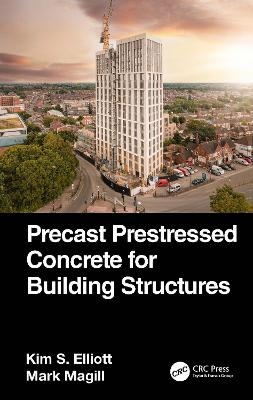
Precast Prestressed Concrete for Building Structures
CRC Press (Verlag)
978-1-032-33391-5 (ISBN)
This guide to precast prestressed concrete (PSC) introduces and applies principles for the design of PSC slabs, thermal slabs, beam and block flooring and main beams, including (where appropriate) cantilevers, and composite and continuous construction.
The book provides numerous worked examples for a wide range of PSC elements and covers the innovative use of PSC on several projects in the UK over the past ten years, drawing on the authors' first-hand experience in the design and manufacture of special products. The contents are in line with latest revisions of the Eurocodes and European Product Standards.
Precast Prestressed Concrete for Building Structures is ideal for consulting structural engineers, clients, PSC manufacturers, and advanced undergraduate and graduate students, both as a guide and a textbook.
Kim S. Elliott is a consultant for the precast industry worldwide and former Senior Lecturer at Nottingham University, UK, and a structural design engineer and site agent at Trent Concrete Structures, UK. He was Chairman of the European research project COST C1 on Semi-Rigid Connection in Precast Structures and is a member of fib Commission 6 on Prefabrication. He is author of Precast Concrete Structures, now in its second edition. Mark Magill is a chartered engineer and the Engineering & Technical Director for Creagh Concrete Products Ltd in Northern Ireland.
1. Commercial Use of Precast and Prestressed Concrete in Buildings. 2. Why Precast, Why Prestressed?. 3. Basis for the Design of Prestressed Concrete Elements. 4. Pretensioning and Casting Methods. 5. Materials, Durability and Fire Resistance. 6. Prestressing and Detensioning Stresses. 7. Flexural Design in Service. 8. Design for Bending Moments Using the Magnel Diagrams. 9. Ultimate Bending Strength. 10. Ultimate Shear Strength and Torsion, and Transmission Length. 11. Serviceability Limit State for Deflections and Cracking. 12. Composite Slabs and Beams. 13. Cantilevers and Continuous Slabs and Beams. 14. Precast Prestressed Concrete Walls. 15. Off-site Benefits and Temporary Works. 16. Case Studies.
| Erscheinungsdatum | 23.03.2024 |
|---|---|
| Zusatzinfo | 86 Tables, black and white; 248 Line drawings, black and white; 164 Halftones, black and white; 412 Illustrations, black and white |
| Verlagsort | London |
| Sprache | englisch |
| Maße | 178 x 254 mm |
| Gewicht | 1233 g |
| Themenwelt | Technik ► Bauwesen |
| Technik ► Umwelttechnik / Biotechnologie | |
| ISBN-10 | 1-032-33391-X / 103233391X |
| ISBN-13 | 978-1-032-33391-5 / 9781032333915 |
| Zustand | Neuware |
| Haben Sie eine Frage zum Produkt? |
aus dem Bereich


